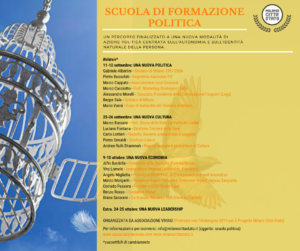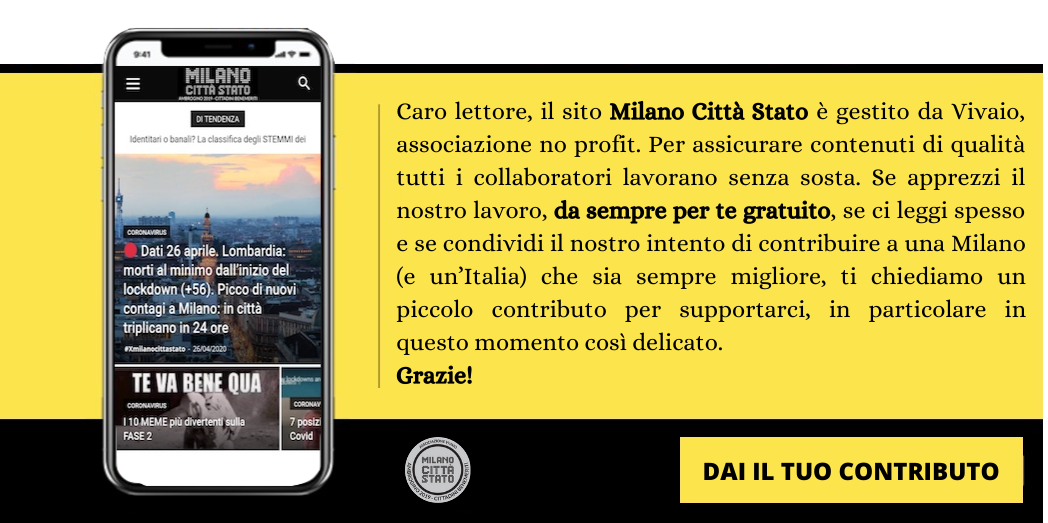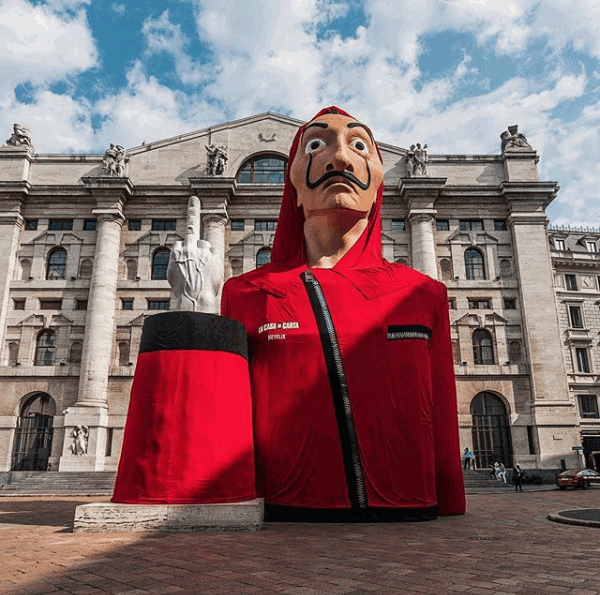Money for nothing. It was the most important song by the Dire Straits music group. It had some lyrics that repeated, obsessively, the same concepts, money for nothing, and chicks for free. It was an attack to the society of the 1980s, featuring useless consumption and easy money, so easy that it seemed everybody could achieve them. And, most importantly, they could be gained without doing anything. If we were to choose a soundtrack for politics in our time, Money for Nothing would be perfect.
Take the MONEY and do nothing: the new frontier of ITALIAN POLITICS
It would be unfair to blame a single political force in Italy for the latest frontier in the politics of our country. Money for nothing is now the only political strategy in our country. And it is the logical evolution of policies being rooted in the past. In order to understand it, it may be useful to take a few steps back.
Digging holes and then filling them again
The State governs, while the production of wealth and jobs are left to the private sector: this subdivision of roles have been the cornerstone of societies until the great crisis of the 1930s: The stock market crash, hyperinflation, the disintegration of savings, endless queues for a loaf of bread. It was a brand new situation for the new nation States that had been transformed by the industrial revolution of the previous century. As an answer, Keynes came along, with one simple idea: if things go wrong, the State must provide jobs. It is not important, Keynes thought, if a job is really useful. Rather, it is better to give everybody a shovel for him or her to dig a hole and then fill it again, it is not important for the work to be useful, it is important for people to work. This is a very easy rule, who led the Western States to fight unemployment with a binge of public jobs. Roosevelt’s America espoused Keynes’ ideas and rose again, exactly like the Nazis did in Germany and the Fascists did in Italy. These worldviews were different, but they had the idea of a lifesaving State providing jobs for its citizens in common.
This was an idea that has been working for a few years, even if we do not know how things would have ended, since such events were interrupted by the greatest and most devastating war the world ever experienced. No one can state whether a link exists between a State providing jobs and a worldwide conflict, what we want to show here is that when the State creates jobs out of thin air, you never know where you might end up.
Money does not make people happy, but…
Indeed, the things changed during the post-war era. The 1950s and the 1960 saluted the Italian economic boom, as the State acted as the State and the market acted as the market. At least, that is what happened in half the world, as the other half decided to let the State do everything. Those were the decades of the Cold War, of the time when the world was subdivided between Good and Evil, when the collectivist models were widespread within the Communist half of the universe, where the citizens were promised equality, jobs and happiness for everyone. However, such a model had its limits. And maybe the biggest limit was due to human psychology and weaknesses: Communism failed because, in the end, it provided jobs, but it gave little money, too little for the people to be happy.
While the other half of the world played music that went money for nothing and chicks for free time and again, on the other side, rather than understanding the attack to an arid and decomposing system, they heard only the guitar riffs and the siren song of the money they did not have, as well as of a world where everything was possible. Money for nothing? Maybe someone in the 1980s, while listening to Mark Knopfler and to the little choruses by Sting, went “mumble mumble”, thinking that a bright political career might be hidden within that sentence.
Mr. Lauro’s shoe
Truth be told, before getting to our times, more than a very successful song, the first seed, the first intuition that power could be achieved by acting on everyone’s greed, was achieved by Achille Lauro. Not by the singer, but by the then-Mayor of Naples.
Called “the Captain”, because of his seafaring past, Achille Lauro was a Mayor during the 1950s and he was a Peronist, even if he went beyond even Peron and his spouse. He made history with his methods to gain votes, such as giving his potential electors a single shoe: he was to give the other only after that the voters proved their vote. It was not yet money for nothing, but shoes for votes, an innovative move, indeed, but still nothing, compared with today’s politics. And yet, before considering our times, we still have to get to another milestone.
“One million jobs“. This was the well-received slogan that, according to many, was the basis of the revolution Mr. Berlusconi led, when, for the first time in the history of Italy, an entrepreneur established a political party out of thin air, achieving a landslide election victory and becoming Prime Minister. Also in this case, it would be unfair to reduce the whole of his success to the promises of jobs he made. His promise, the promise he held to with both his words and his example, was that of success. A success one may gain with hard work but, mostly through relations, shortcuts and a convincing smile. For other things, his strategy was similar to that of the 1930s, calling on the State to create jobs, even if it did not achieve this goal through public works and with the taxpayers footing the bill, but, rather through a cultural model who spread within the country, indeed the model sung by the Dire Straits, involving money for nothing, easy money, available girls, of success with no hardships. And if this does not happen thanks to the market, then it is due to debts.
Work for nothing
The idea of money for nothing was perhaps already present within the political subconscious, and from the 1980s onwards, it became the cornerstone of the explosion of public debt used to buy votes, create cronyism and ceaselessly proposing a lifestyle going beyond the actual possibilities, leaving the future generations to foot the bill. And the bill came with the new millennium, when, only to pay for the interest on the debt of two decades earlier, the debt itself ended up in a spiral that those dealing with loan sharks know well: making debts in order to pay debts. Debt after debt, this led our country to make more and more debts and to become poorer and poorer, achieving one of the lowest growth rates amongst the economies all over the world.
After years of struggle and regression, when often, rather than money for nothing, the song has become work for nothing, work as much as you can, but nothing will remain in your pocket in the end. This is true for small enterprises or for business owners, as well as for young interns busting their asses off for an unpaid traineeship. It is implied that many want to flee: this is the case with the people and also money looking for an haven in places where the cause-effect link is not money for nothing or work for nothing, but working for money and money for work.
From the emergency stopping lane to the fast lane
And now we get to the current times. Italy may have many flaws, but it surely is not lacking in one thing, for good or evil. Italy is a wonderful place, often being ahead of what is going to happen in the rest of the world. Therefore, the country having given birth to the Renaissance, the Catholic Church, the discovery of the Americas, but also the Inquisition and Fascism, is now using the turn signal, shifting from the emergency stopping lane to the fast lane directly, waving with its hand towards the column of the cars of the other nations, as they are jammed up in a constant growth, something too ordinary for us. The car that is Italy, after a breakdown of twenty years, now put its pedal to the metal, playing the “Money for Nothing” song from an old audio cassette.
Think about it. Aren’t the two great reforms by the yellow-green government, i.e. the “quota 100” early retirement scheme and the basic income money for nothing? And this was only the appetizer. Close your eyes and think about Premier Conte appearing on the TV with his speeches, at 8 PM. What comes to your mind? 80, 150 or 450 billions? And, most of all, what were they promised for? For payroll subsides, for persons undergoing hardships, for the self-employed, for the employed, for those who are still home, for those who cannot do it, but also for those who can do it, for companies weathering a crisis, for State-run companies, for private-run companies to be turned into State-run companies, money, money, money for nothing. And also without the efforts that were made in the past, connected with providing them for something, without public works, without people that, equipped with their shovels, builds highways or digs holes in order to fill them afterwards. The stroke of genius, here, is understanding that, more than giving money to those who work, giving them for the others to do nothing is even better. A stroke of genius, as a founding Member State of the EU, having given it all in building, create and imagine a new future amongst the EU Member States won every negotiation simply asking for that: money for nothing. Money for nothing. And this was achieved.
As it is the case with every song, also Money for Nothing does finish in the end
These policies understood something akin to genius. Money can be given and promised, even when one does nothing to deserve them. This is like the allowance your father gives you just because you exist, it is welfarism from the cradle to the grave, it is receiving money for nothing. This is the consequence of a country built for those who live off their private income, more than for those who produce, for those who control more than for those who create value, for the assisted more than for those who assist.
Now, it all seems to be a beautiful story. The whole of the Italian politics, yellow, red, blue and green, speaks with a single voice, a competition between those who promise more money for nothing, a challenge seeming both irresistible and without any negative elements. The problem here is that, as it is the case with every story starting well, there is always a “but” liable to ruin everything.
The only problem here is that money do not last forever. One cannot make debts forever, we cannot be aided by Europe all the time, and, should we do it again someday, currency cannot be printed without depreciating the value of money by the same token.
Therefore, what is going to happen when the toy will break? After having fostered and spread a parasite-like mentality based on demanding without giving, on constantly depending on someone else while remaining in a state of constant passiveness and destruction of wealth, the only logical consequence of it all will be to find a scapegoat. Today the trouble comes from a health-based emergency, tomorrow it could be the wealthy, or, more probably, some hidden potentate, dragging us in a devastating war.
However, the responsibility for what will happen is only ours, right now. As Jean Paul Sartre said, “you are always responsible for what you could not avoid”. Today, all of us, with our laxity towards rhe policies enacting money for nothing, giving our consent to all of this, are becoming accomplices to the disintegration of our country.
Get your money for nothing. Get your chicks for free
The italian version: Prendi il DENARO e non far nulla: la nuova frontiera della POLITICA ITALIANA
ANDREA ZOPPOLATO (Translated by ANTONIO BUONOCORE)

Se vuoi collaborare al progetto di Milano Città Stato, scrivici su info@milanocittastato.it (oggetto: ci sono anch’io)
🍾 ENTRA NEL CAMBIAMENTO: Ti invitiamo a iscriverti alle nuove newsletter di milanocittastato.it qui: https://www.milanocittastato.it/iscrizione-newsletter/
Ti manderemo anche notizie che non pubblichiamo sui social
Le città più internazionali e aperte al mondo sono delle città stato come #Amburgo #Madrid #Berlino #Ginevra #Basilea #SanPietroburgo #Bruxelles #Budapest #Amsterdam #Praga #Londra #Mosca #Vienna #Tokyo #Seoul #Manila #KualaLumpur #Washington #NuovaDelhi #HongKong #CittàDelMessico #BuenosAires #Singapore
SOSTIENI MILANO CITTÀ STATO















